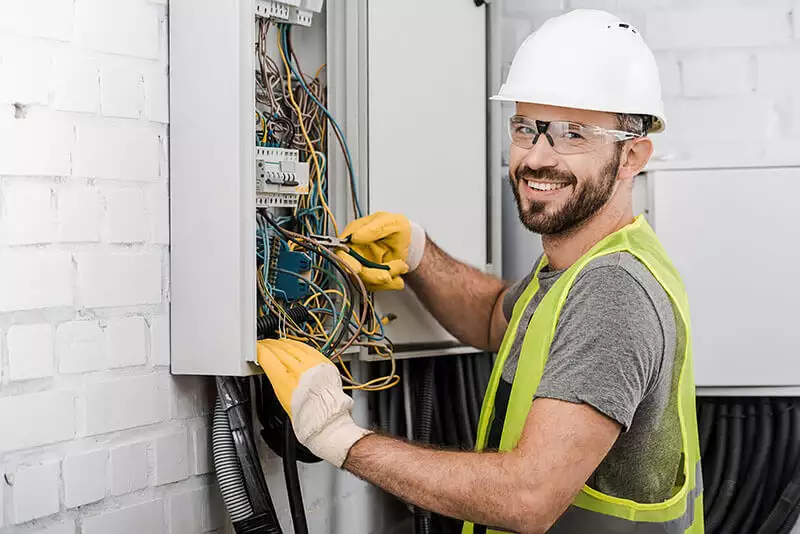A flickering light might seem harmless but it could be your home’s way of waving a red flag. Electrical issues rarely announce themselves with a fanfare yet their dangers can escalate quickly if left unchecked. Spotting the difference between a minor nuisance and a serious hazard isn’t always straightforward.
You might pride yourself on tackling odd jobs but electricity demands respect and expertise. Knowing when to call an electrician could save you from costly repairs or far worse. If you’ve ever wondered whether that buzzing socket or persistent trip switch needs a professional’s touch you’re in the right place.
Signs You Need to Call an Electrician
You will spot warning signs before problems spiral. Your instincts might tug at you when something seems off with your electrics. If you’re ever in doubt, ask experts however. Make a local internet search, something like ‘electricians Stevenage’, or somewhere more relevant to you will get the ball rolling.
Flickering or Dimming Lights
Flickering or dimming lights in your home can signal problems in your wiring or faulty fixtures. You might hear a faint buzzing, then a light will dip and surge, especially when you switch on appliances like microwaves or heaters. Multiple rooms affected or persistent flickering narrows the culprit to deeper wiring or overloaded circuits. Ask yourself—do your lights flare wildly when your kettle boils or the washing machine starts rumbling. Spotting this rhythm, you will sense when your circuits cry for professional intervention.
Frequent Circuit Breaker Trips
Frequent circuit breaker trips suggest your system is surrendering under demand or faults in the wiring are lurking. If you flip a switch and your power clicks off repeatedly, there can be overloaded circuits or short circuits hiding in your walls. Some houses live through this dance once in a while, but your breakers will croak for help if trips start too often or without clear cause. If you notice your sockets silent after every rain or a new kettle triggers a trip, your wiring is revealing a tale. You will find that breakers are built to protect but act as storytellers for electrical woes.
Burning Smell or Scorched Outlets
A burning smell or scorched outlets spell danger and demand immediate action. When you catch acrid odours, or dark smudges bloom around outlets, your installation might be overheating. Sometimes you spot no visible signs, but a sudden plastic stench creeps into your hallway. Check for warmth under your palm, ask if sockets look tired or cracked—your walls will whisper secrets if you lean close enough. In the case that these symptoms swarm, you will know your home is warning you before fire risks grow. Can you recall when a faint whiff once signalled a failing plug nearby? That’s your cue.
Common Electrical Problems Requiring Professional Help
You will find that household electrical issues like these rarely solve themselves. Sometimes your patience or caution gets rewarded with a sudden spark or a smell that pricks your senses. Ever walked into your lounge and felt a faint buzz from a power socket or watched a kitchen light flicker like an old theatre sign? That’s when a professional’s touch matters.
Faulty Wiring and Outlets
You can spot faulty wiring when outlets hum, spark, or show scorch marks. Sometimes you touch a plug and warmth seeps through—a signal that wires are fraying behind your walls. Flickering lights, frequent fuse blows, or tripped circuits can hint at deeper electrical chaos. A loose connection might make sockets unreliable while a single outlet refusing to work might be traced to a cascade of older faults in your system. Wiring that harks back decades can crack, leaving your safety hanging by a thread. You might press a plug home but still nothing flows; old, faulty installations can play tricks on you that only a skilled hand will decode and repair.
Installation of New Appliances or Fixtures
You could be fitting a sleek induction hob or bringing home a power-hungry heater—a scenario where existing home circuits might groan under the load. Ask yourself whether your present wiring was built for modern gadgets; often it wasn’t. Newer ovens, hot tubs or electric showers can demand dedicated circuits you probably lack. Even replacing light fittings or ceiling fans sometimes brings up confusion: would the switch wiring cope, does your fuse board need an upgrade, are the fixtures earth protected? In the case that your lighting plan calls for new recessed lights or your entertainment system needs a raft of sockets, professional work matters to protect your insurance, warranty, and personal safety.
Safety Concerns and Emergencies
Sometimes your home tries to talk to you. It whispers with a spark. It groans when wires strain. Listen well and you’ll catch these warnings before small troubles flame into more. If the air tastes hot and the walls buzz under your fingers, you know something waits to be fixed.
Electrical Shocks
Your fingertips snap with energy and you step back, heart jumping. That jolt isn’t a gentle warning; it signals hidden faults lurking behind switches or sockets. When a family member brushes a plug and feels a tingle, you’ve seen the sign. Maybe you feel reluctant to touch that fitting again and rightly so. You will discover—often suddenly—that even a minor shock can mean faulty grounding, wire insulation gone brittle or unseen water damage. You might try to ignore it, telling yourself it’s just static but the feeling lingers. Your routine becomes cautious, even anxious. In the case that you face repeated shocks from different outlets, you will need to act. Call an electrician; do not hunt for answers alone.
Power Outages in Parts of Your Home
You step into a room. Darkness presses at your shoulder though the sun blazes outside. Appliances sit silent and lifeless while the neighbour’s telly hums away. Patterns reveal themselves if you notice—one half of your kitchen blinks out each time you use the kettle. You will find that rooms share problems, entire strips of sockets refusing to cooperate. You wonder if you’ve overloaded a breaker, or if a fuse has resigned behind the scenes. Perhaps those issues point to loose wiring, outdated fuse boards or even weakened connections at the main panel. The problem can deepen faster than you expect. In the case that unexplained outages reoccur, invite an expert in. Sudden loss of power over part of your house will not fix itself and your safety depends on it.
Benefits of Hiring a Professional Electrician
You’re standing with wires trailing through your hands. Do you wonder, is this really something for you to tackle? A professional electrician brings more than skill. With wiring, one wrong connection and you might find those light switches dancing to their own strange rhythm. You will find that certified training means your contractor knows precisely which fuse needs gentle persuasion and which socket should get retired. Some spark-chasing tasks might look simple enough but can mask old wires waiting to trip you up or rules that might not shout their presence until insurance or council inspectors weigh in.
What price on peace of mind? Think about the standards a qualified professional maintains. Compliance becomes second nature to them. You will spot the evidence in their neat cabling and the way they attend to covers and junction boxes. Regulations shift as often as British weather; you really might want someone who lives inside the rules. Insurance claims often come tethered to paperwork, so you might be asked—did you use a licensed expert or gamble with a friend’s advice? Unqualified installations can lead to rejected claims and extra costs that arrive as quietly as a draught in winter.
You wind up with fresh wires and a fuse box that hums quietly to itself. There’s a world of difference between a quick fix and a solution that endures. Unexpected shorts? Flickering bulbs? Those become rare guests. You will find longevity and safety sitting silently where once there was worry and repeated calls. Plenty of homes carry scars from rushed or DIY work. With professional help, your install lasts and the risk of future outages shrinks.
Risk, too, winds its way through this. In the case that safety is your first concern, you will recognise that professionals carry specialist tools that ordinary drawers can’t provide. Fault-finding gadgets and thermal testers catch what’s invisible to the eye. How often do you find yourself with only a screwdriver and optimism? Leave scorching outlets and burnt smells to someone who’s got both experience and the right kit.
Ask yourself whether you feel confident untangling codes and connections. If you hesitate, you will discover that a specialist brings efficiency, knowledge, and assurances. Working with professional electricians, you stay on the safe side, spend less time fretting, and keep your home glowing long after the work is finished.
Wrapping Up
Staying alert to your home’s electrical signals is essential for your safety and peace of mind. It’s never worth risking your wellbeing or your property’s value by ignoring warning signs or attempting repairs beyond your expertise.
When you trust a qualified electrician, you’re not only addressing immediate problems but also safeguarding your home for the future. Prioritise professional help and you’ll protect both your loved ones and your investment.
Keep an eye for more latest news & updates on Daily!



